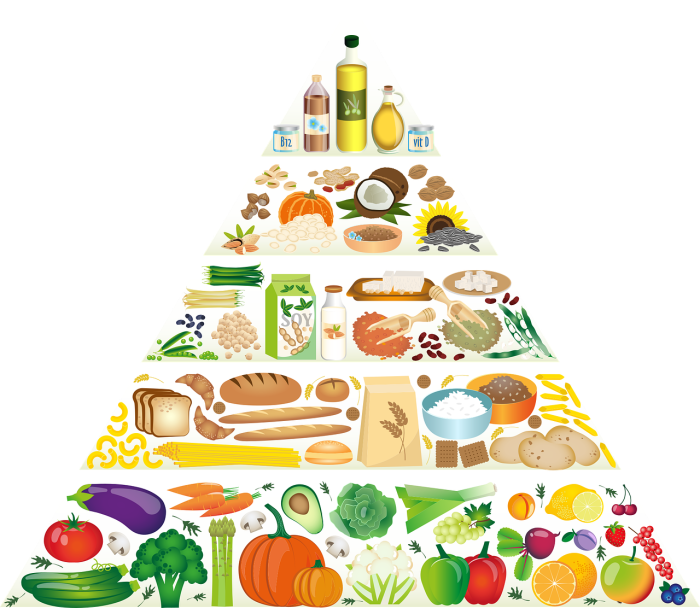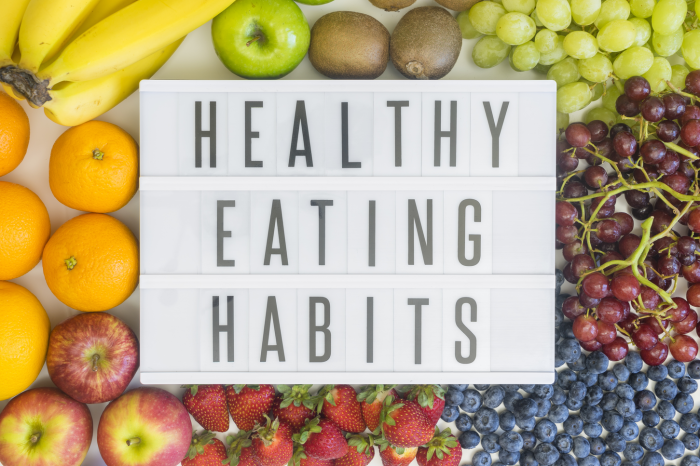Healthy Eating Habits take the spotlight in this guide, inviting you to a world where good nutrition is key for a vibrant life. Get ready to dive into the delicious details of fueling your body the right way!
Let’s explore the components of a balanced diet, practical tips for developing healthy eating habits, the impact on specific health conditions, and recommendations for different age groups. It’s time to nourish your body and mind with the power of healthy eating!
Importance of Healthy Eating Habits
Maintaining healthy eating habits is crucial for overall well-being. It not only provides essential nutrients to the body but also helps in preventing various health issues.
Benefits of Healthy Eating
- Eating a balanced diet can boost the immune system, reducing the risk of illnesses and infections.
- Healthy eating habits can improve energy levels and overall productivity throughout the day.
- A nutritious diet can help in maintaining a healthy weight, reducing the risk of obesity and related diseases.
- Proper nutrition is essential for healthy growth and development, especially in children and teenagers.
Impact on Physical and Mental Health
- Healthy eating habits can improve concentration and focus, leading to better academic performance.
- A diet rich in fruits, vegetables, and whole grains can reduce the risk of chronic diseases such as heart disease, diabetes, and cancer.
- Proper nutrition can also positively impact mental health, reducing the risk of depression and anxiety.
- Good eating habits can promote better sleep patterns and overall well-being.
Components of a Balanced Diet

Eating a variety of foods that provide essential nutrients is key to maintaining good health. A balanced diet consists of proteins, carbohydrates, fats, vitamins, and minerals, each playing a crucial role in keeping our bodies functioning properly.
Proteins
Proteins are essential for building and repairing tissues in our bodies, including muscles, skin, and organs. They also help produce enzymes and hormones that regulate various bodily functions. Foods rich in proteins include lean meats, poultry, fish, eggs, dairy products, legumes, and nuts. Incorporating these foods into your diet can help maintain muscle mass, support immune function, and keep you feeling full and satisfied.
Carbohydrates
Carbohydrates are the body’s main source of energy. They provide fuel for our brains, muscles, and other organs to function optimally. Whole grains, fruits, vegetables, and legumes are excellent sources of carbohydrates. These foods also contain fiber, which aids in digestion and helps control blood sugar levels. Consuming a variety of carbohydrates can help sustain energy levels throughout the day and support overall well-being.
Fats
While fats often get a bad reputation, they are essential for absorbing certain vitamins, regulating body temperature, and providing long-term energy storage. Healthy fats, such as those found in avocados, nuts, seeds, and olive oil, can help improve heart health, brain function, and skin health. Including these fats in moderation in your diet can contribute to overall health and well-being.
Vitamins and Minerals
Vitamins and minerals are micronutrients that play various roles in the body, from supporting immune function to aiding in metabolism. Fruits, vegetables, whole grains, dairy products, and lean proteins are great sources of vitamins and minerals. Consuming a diverse range of these foods can help prevent deficiencies and promote optimal health.
Tips for Developing Healthy Eating Habits

Eating healthy is essential for overall well-being and vitality. Here are some practical tips to help you develop healthy eating habits and make nutritious choices a part of your daily routine.
Meal Planning and Preparation
Meal planning is key to maintaining a healthy diet. Take some time each week to plan your meals and snacks. This will help you make healthier choices and avoid the temptation of fast food or unhealthy options when you’re hungry. Preparing meals in advance can also save you time and money, making it easier to stick to your healthy eating goals.
Healthy Snacking
Instead of reaching for a bag of chips or candy, opt for healthier snacks like fresh fruits, vegetables, nuts, or yogurt. Keep these items readily available so you can make better snack choices throughout the day. Planning ahead and having healthy snacks on hand can prevent mindless eating and help you stay on track with your nutrition goals.
Stay Hydrated
Drinking enough water is essential for good health and can also help you control your appetite. Sometimes feelings of hunger are actually signs of dehydration. Aim to drink at least 8-10 glasses of water a day and consider carrying a reusable water bottle with you to stay hydrated on the go.
Practice Portion Control
Being mindful of portion sizes can help you avoid overeating and consume the right amount of nutrients your body needs. Use smaller plates, measure out servings, and pay attention to hunger cues to prevent eating more than necessary. By practicing portion control, you can enjoy your favorite foods while still maintaining a balanced diet.
Seek Support and Accountability
Share your goals with friends, family, or a support group to help you stay motivated and accountable. Surround yourself with people who encourage and support your healthy eating habits. Consider joining a cooking class, fitness group, or online community to connect with others who share your wellness goals.
Impact of Healthy Eating on Specific Health Conditions
Eating a healthy diet can have a significant impact on preventing and managing various health conditions such as diabetes, heart disease, and obesity. By making smart food choices and focusing on nutritious options, individuals can improve their overall health and reduce their risk of developing these conditions.
Diabetes
- A diet rich in whole grains, fruits, vegetables, lean proteins, and healthy fats can help regulate blood sugar levels and manage diabetes effectively.
- Avoiding sugary drinks, refined carbohydrates, and processed foods can prevent blood sugar spikes and complications associated with diabetes.
- Consulting with a registered dietitian to create a personalized meal plan can ensure optimal management of diabetes through diet.
Heart Disease, Healthy Eating Habits
- Following a heart-healthy diet low in saturated fats, trans fats, cholesterol, and sodium can reduce the risk of heart disease and improve cardiovascular health.
- Incorporating foods high in fiber, antioxidants, and omega-3 fatty acids can support heart health and lower cholesterol levels.
- Limiting consumption of red meat, processed foods, and added sugars can protect the heart and prevent complications related to heart disease.
Obesity
- A balanced diet focusing on portion control, nutrient-dense foods, and regular physical activity can help prevent and manage obesity.
- Choosing whole foods over processed foods, and prioritizing vegetables, fruits, lean proteins, and whole grains can support weight management goals.
- Seeking support from a healthcare provider or nutritionist can provide guidance on creating a sustainable eating plan to address obesity and promote a healthy weight.
Healthy Eating Habits for Different Age Groups
When it comes to healthy eating habits, it’s essential to consider the varying dietary needs of different age groups. From children to teenagers, adults, and the elderly, each stage of life requires specific attention to nutrition for optimal health and well-being.
Children
- Encourage a variety of fruits, vegetables, whole grains, and lean proteins to support growth and development.
- Limit sugary drinks and snacks high in saturated fats to prevent childhood obesity and promote healthy weight management.
- Set regular meal times and involve children in meal preparation to instill lifelong healthy eating habits.
Teenagers
- Focus on nutrient-dense foods like lean proteins, whole grains, fruits, and vegetables to support growth spurts and active lifestyles.
- Encourage balanced meals and snacks to provide sustained energy throughout the day and prevent unhealthy eating habits.
- Teach teenagers the importance of mindful eating and listening to their body’s hunger and fullness cues.
Adults
- Aim for a balanced diet that includes a variety of food groups to meet nutritional needs and reduce the risk of chronic diseases.
- Practice portion control and mindful eating to maintain a healthy weight and prevent overeating.
- Stay hydrated, limit processed foods, and prioritize whole, unprocessed foods for optimal health and well-being.
The Elderly
- Focus on nutrient-dense foods that are easy to chew and digest to support overall health and prevent malnutrition.
- Include sources of calcium and vitamin D for bone health and incorporate fiber-rich foods to support digestion and gut health.
- Consult with a healthcare provider or dietitian to address any specific dietary needs or concerns related to aging and health conditions.
Hey, are you looking for some fresh content marketing ideas to boost your brand? Well, you’ve come to the right place! Whether you’re brainstorming for your next campaign or just need a little inspiration, we’ve got you covered. From interactive videos to engaging social media contests, we’ve got the tips and tricks to help you stand out from the crowd.
So, what are you waiting for? Let’s get creative!
Hey there, looking for some fresh Content Marketing Ideas to boost your brand? Well, how about creating engaging videos that showcase your products in action? Or maybe hosting a webinar to share industry insights with your audience? Don’t forget to leverage user-generated content to connect with your customers on a personal level. Get creative and watch your marketing efforts soar!












